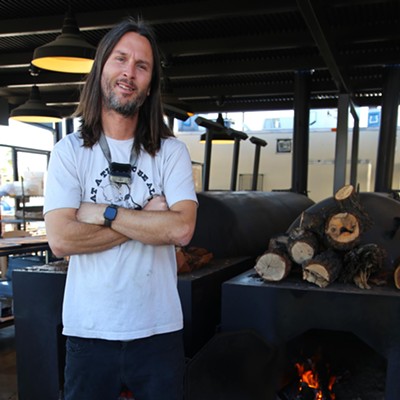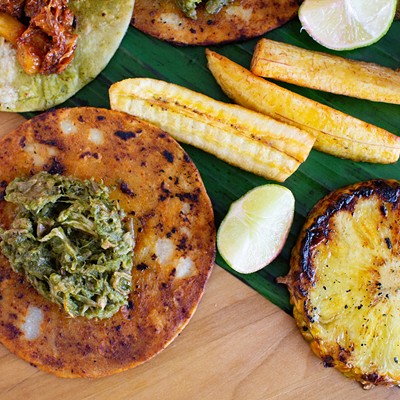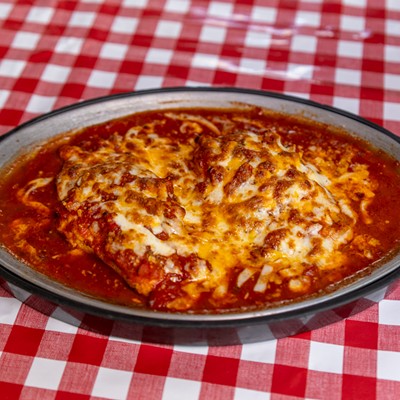The old train station at 400 N. Toole Ave. has long been a scene of failure: first, the failure of American railroads, and more recently, the failure of a restaurant whose inexperienced owners blamed street construction for their own lack of success.
But for the past several months, the station has been the scene of steadily building success. Maynards Market and Kitchen was initially a little uneven in terms of cuisine and service, and a couple of posters to the Tucson Weekly's Web site complained that the staff was snooty. Well, if that was true once, it isn't anymore; if anything, the waitstaff checks your status a little too often, stopping just short of being intrusive. Better that than being ignored. As for the menu, it's a combination of well-prepared standards (pork chops, a couple of steaks) and a few imaginative inventions that offer surprises without delving into weirdness. The food we recently sampled was terrific, with a couple of small exceptions.
Maynards, you'll notice, has no apostrophe, implying things plural. It seems to have been named for two men named Maynard: a local train engineer and a certain famous artist who painted a mural in the station decades ago. The operation itself is plural, too. The station's west building is a general-purpose market, sort of a Rincon Market lite, that features local items and includes table seating for the consumption of deli sandwiches, pizzas and desserts. The east building holds the full-service restaurant. The kitchen takes up the street side of the building; the public side is a long, narrow space (like a train's dining car) with large windows looking onto the tracks.
The interior décor, naturally, features an "iron horse" motif—lots of black railroad iron, including a divider along the bar that evokes train wheels. Black is the principal color here: black leather chairs, black napkins contrasting with the simple white plates, black tabletops (spread, incongruously in a nice restaurant like this, with white paper equipped with a cup of crayons; sure, Maynards serves pizza, but this ain't Chuck E. Cheese's). The room can get noisy, depending on how many tables are filled and who's sitting at them.
The menu fits onto a single page, which is a good idea; restaurants with large menus often wind up either bungling half the items or cranking out a dozen dull variations on the same thing. At Maynards, about a third of the offerings are starters and salads; there are a dozen entrées, including grilled meats, and the remainder of the page is given over to stone-baked pizzas and side dishes. Everything is offered à la carte, so if you want some veggies or carbs with your lamb chops, you'll have to order them separately. Several of the first courses and all the sides are available in small and large portions; go large only if you're not ordering an entrée.
The citrus and dandelion salad, for example, was a substantial plate of greens even in the more modest portion ($5; it's $8 for the large version). This salad, actually, was one of the few disappointments. Oh, the field greens (a variety, not just dandelion) were fresh and crisp, and the local honey-lemon dressing, finished with lavender, was refreshing. But the citrus? Exactly two little bits of grapefruit lurked beneath the pile of greens. Either the salad hadn't been adequately tossed, or the grapefruit was being hoarded for use in other dishes; executive chef Addam Buzzalini, formerly of jaxKitchen, seizes on whatever is at its peak and insinuates it wherever he thinks it will do the most good. On one night last week, for example, grapefruit turned up in three of our dishes, including one of the desserts, and it was welcome at each appearance. It would have been even more welcome in the citrus-dandelion salad.
We couldn't quibble with much else. The summer soup of the day ($6) was a cool, simple honeydew purée, full of natural melon flavor and just a touch of mint. The cheese plate ($4 for one ounce, or $12 for a five-cheese sampler) was terrific, including a great Roaring 40s blue cheese. The bread was a little salty, but soft and chewy with a manageable crust.
One entrée that went a little wrong was the fish of the day, grilled sea bass served with artichoke, grilled squash, big bright peas, asparagus, mushrooms and chive oil. Everything on the plate was superb—except the bass, which was dry and overdone.
We had no complaints about the top sirloin ($19), a reasonable 9 ounces of tender char-grilled beef accompanied by a touch of warm Stilton cheese and crispy bits of fried onion. The quantity of Stilton was modest, so the real cheese fix came with the separate side of ziti baked with four cheeses and topped with bread crumbs ($5 small). Really, it was impossible to discern the individual contributions of the goat cheese versus the smoked mozzarella, but it all blended into a tasty, creamy, steaming binder for the pasta.
The real winner on the menu is one of the oddest offerings: a zucchini-goat cheese pancake served up with a variety of sautéed wild and portobello mushrooms, heirloom cherry tomatoes, green beans, roasted garlic and herbs, plus a big, fluffy dollop of chilled corn custard. The pancake held together well yet was moist, and the vegetables had tremendous flavor. The custard seemed like merely some sort of inoffensive texture in the mouth until you swallowed; it left behind a wonderful, if subtle, aftertaste. On the menu, this dish is billed, somewhat misleadingly, as "foraged mushrooms" ($18); try it.
Desserts are brought over from The Cup in Hotel Congress; both establishments are owned by Richard and Shana Oseran, who actually understand how to run profitable businesses downtown. The dessert selection changes frequently (the old-style strawberry shortcake, for example, will be around only as long as they can find good berries), but the portions are consistently generous without being gaggingly rich. These fine desserts, along with the pizzas and some special snacks, constitute the late-night menu.
Maynards is hip but not exclusive, and rightly focuses on a small selection of well-prepared dishes. Along with such stalwarts as Café Poca Cosa and Barrio, it's a model of what fine, contemporary downtown dining should be.









